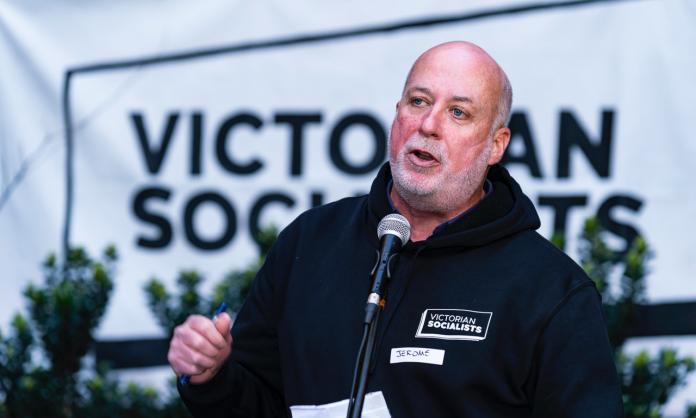I’ve loved being a candidate in the Victorian election.
There. I’ve said it.
I love throwing people a line about billionaires or the state of the world, and seeing what those people throw back at me.
My campaign mainly consisted of thousands of one-on-one chats—on street stalls, on people’s doorsteps and, for the last couple of weeks, at polling booths as people arrive to vote.
“How’s it going? I’m Jerome, I’m the candidate for Victorian Socialists.”
My conversations often start with me handing over a leaflet and making a pitch: “We think it’s crazy that the billionaires keep doubling their money while the rest of us are left behind. Here’s a bit of info on our policies—especially reversing privatisations in aged care and child care, and putting politicians on a nurses’ wage”.
I might add a sentence or two. Then I ask whoever I’m talking with: “What issues matter to you?”
Often enough, this will get a discussion going. Sometimes it’s a particular one of those words—sometimes “billionaires” but more likely “aged care”, “child care”, “privatisation” and “nurses”—that sparks a response.
“Everything’s getting more expensive”, a woman tells me on the Epping early voting booth. “And now the big bulk billing GP clinic has decided to not bulk bill any more.”
“My kids have been sick a lot in the past few months”, she continues, a tone of exasperation rising in her voice: “What are we meant to do? Pay for a doctor? Or pay for groceries?”
This is a scandal, I respond—maybe we should make it a public scandal. Maybe we can get some families down at the front of the clinic and get the media there, to make the point this is real money that people don’t have. We could start a petition as a way to talk with people.
We might not be able to win everything, I say, but we should at least start raising our voices to demand what we need. If we just shrug our shoulders and assume we can’t beat city hall, we’ll never win anything.
The woman thinks it’s a great idea. So do other people who I raise it with. But it’s testament to the low level of political protest and organisation in working-class suburbs nowadays that none of them indicate they’ll run with it. I give my phone number to a few of them. We’ll see if we can get anything going, or whether the injustice of families having to decide between groceries and medical bills becomes another sickening fact of life in yet another working-class suburb.
Some of the most heartfelt responses to my pitch come from health workers.
Very often, nurses and other workers in health care and aged care are reserved, unwilling to unload to a stranger about the conditions in their workplace.
Sometimes, when they’ve mentioned they’re a nurse and I ask how that’s going, people tense up and respond with just one or two terse words. “Shit”, “Disgusting” and “Never seen it so bad” are some of the answers I’ve had, multiple times. “I left”, “I’m leaving”, and “Twenty of my colleagues have resigned this year” are other responses. “And that’s the thing”, one woman explains. “The public system is being run into the ground, and we’re all meant to go private.”
Sometimes, a health worker gets beyond the brief responses and opens up a bit. And it becomes a torrent.
Dawn tells me that she’s totally overloaded and burned out. When she asked management for some time off and to come back part time, with extra support, their response amounted to, “Well, maybe this role isn’t for you”—and they started the process of managing her out of the workplace.
“That’s disgusting”, I tell her, as I mimic management looking at some contraption in their hands: “Oh, this one’s broken, chuck it out. Oh, there’s not another one to replace it. Ah well, too bad”.
I ask Dawn to call me in two weeks to see if I’ve won the election, and to make a time to meet so I can learn more about the situation in her workplace. And, in the back of my mind, to see if there are possibilities to organise.
I tell Dawn’s story to maybe a dozen more health workers over the next few days. Each one of them instantly relates.
“The amount of bullying and aggression against workers is just unbelievable. Every. Single. Day”, one woman tells me, shaking her head.
“From patients?” I ask, to clarify.
“Oh no”, she replies. “From management.”
I remark that in the past we had some stronger unions that could put bullying managers in their place. It’s a point I make often enough—a concrete way of describing the sort of “people power” that Victorian Socialists are dedicated to rebuilding.
The worker shakes her head. “It’d be good, but nowadays management and the union are like one bloc, together, working 100 percent for management and their agenda.” She’s in the Health Workers Union.
Building collective power in a workplace rife with worker despair and well-organised management bullying requires detailed work. And it’s ten times harder if there’s an entrenched union machine that marches in lockstep with management.
I ask her to do me a favour. “This leaflet has my phone number on it. If I win, call me in two weeks. Please ask me what I’ve done in that time to highlight what’s happening in our hospital system. And see if we can meet—I want contact with a lot of workers in the front line, who can tell me directly what’s really happening.”
It’s early voting at Craigieburn and a guy wants to make a point. I offer a leaflet but he doesn’t just say no, or shake his head. He states firmly and clearly to anyone within earshot: “No! I won’t take your leaflet! I will not take your leaflet!”
Sheesh OK, I’m thinking, as I start moving away. You get plenty of knockbacks, as well as plenty of conversations, on a voting booth line. And once in a while, there’s someone so totally pissed off with the farce that passes for official politics that they want to shout at anyone connected with the whole process—including me. Fair enough.
This is not one of those people, though.
“I don’t need your leaflet!” the man declares again, to everybody within earshot. “I don’t need you’re leaflet because I’m voting for you already. And the reason I’m voting for you—is Palestine.”
We chat for a minute. I start telling him about a few of the things I’ve done since 2008-09, when the Israeli army’s slaughter of 1,400 Palestinians in Gaza in Operation Cast Lead propelled me into Palestine solidarity activism.
“Don’t worry, I know”, the man tells me. “I look all around the world at parties supporting Palestine. And believe me, I don’t know any that speak so fearlessly for Palestine as Victorian Socialists.”
On election day in Craigieburn north-west, Mohammed is wearing fluoro. We never get to discuss what sort of work he does, though: he’s busy interrogating me on the fundamentals.
He looks at me sternly. “OK so you’re Victorian Socialists. What does socialist mean?”
Workers create pretty much all the wealth of society, I tell him in reply. But we don’t decide what we produce—whether we build shopping malls or low-cost housing. Some unelected super rich guy decides that instead.
Socialism is when workers not only produce the wealth, but democratically decide what wealth we’ll create, and everything else about how our society runs.
“Well, you say ‘democracy’, but democracy doesn’t even work”, Mohammed tells me bluntly: “The politicians are just puppets.”
I agree 100 percent, I say. We need a new sort of democracy. Under socialism, workers meet and elect a representative. Those representatives decide the government. If we don’t like what our reps are doing, we can call a meeting and vote them out.
Not like here, I explain, where we vote only every four years, the politicians can make promises and then break them, and we can’t do anything about it—and in any case, we never get to vote for the rich people who dominate our society. I must have missed the vote, I remark, where we decided a whole bunch of billionaires like Rupert Murdoch control our media.
“OK, well they’re not going to agree to that, are they.”
No they’re not. In my opinion, I tell Mohammed, we’ll need a revolution to overcome capitalism. And that’s not going to happen just because he votes for me.
But what can happen from voting for me is that we put that sky-high politician salary into organising, and building a movement. That I use that platform and those resources to help do the things I’ve done for my whole adult life—helping workers and other ordinary folk to organise to force the moneybags to give us the things we need. And those struggles are how we start building the collective strength we’ll need to actually achieve socialism.
“OK, you’ve got my vote.”
I laugh, thank him, and then joke that he made me work hard for it. For a moment I regret making that comment when he nearly shouts at me: “Well I have to! You can’t just turn up and say, ‘Vote for me’”.
I agree with him, of course. And then I ask him a favour. If I get elected, after two weeks can he call me and ask me: “What the hell have you done? You’ve had two weeks! C’mon! It’s one thing to talk a big game on the election line, what have you actually done?!?!”
Now it’s Mohammed who cracks up laughing. “OK I will”, he responds—and then turns suddenly serious again. “On one condition. You have to come over to my place for dinner.” Yeah, for sure, I say.
“Well are you going to actually show up?”, Mohammed demands.
I’m going to have to, I explain—otherwise he’ll tell everyone in the voting line, “Don’t believe this guy, he says he’ll come to dinner and then doesn’t even turn up!”
We both crack up this time.
I love these conversations, and the people I have them with. I honestly don’t know what will come out of it all. But in my mind, all of our conversations, each of us, and the whole campaign, are all part of a project.
The project of Victorian Socialists is that all of us—Dawn, Mohammed, the woman so outraged over the outrageous destruction of free medical services, the health workers, myself, each one of Victorian Socialists’ 1,000 plus election day volunteers, and everyone who contributed to this campaign—we’re all part of a movement in the making.
A movement that knows that every injustice is also an opportunity to organise. A movement that helps workers organise and fight for wages and for dignity, for bread and for roses. A movement that stands up for Palestine. A movement that wins people to socialism, and fights for it.
Win, lose or draw, I could not be prouder of the campaign we’ve all been part of.









